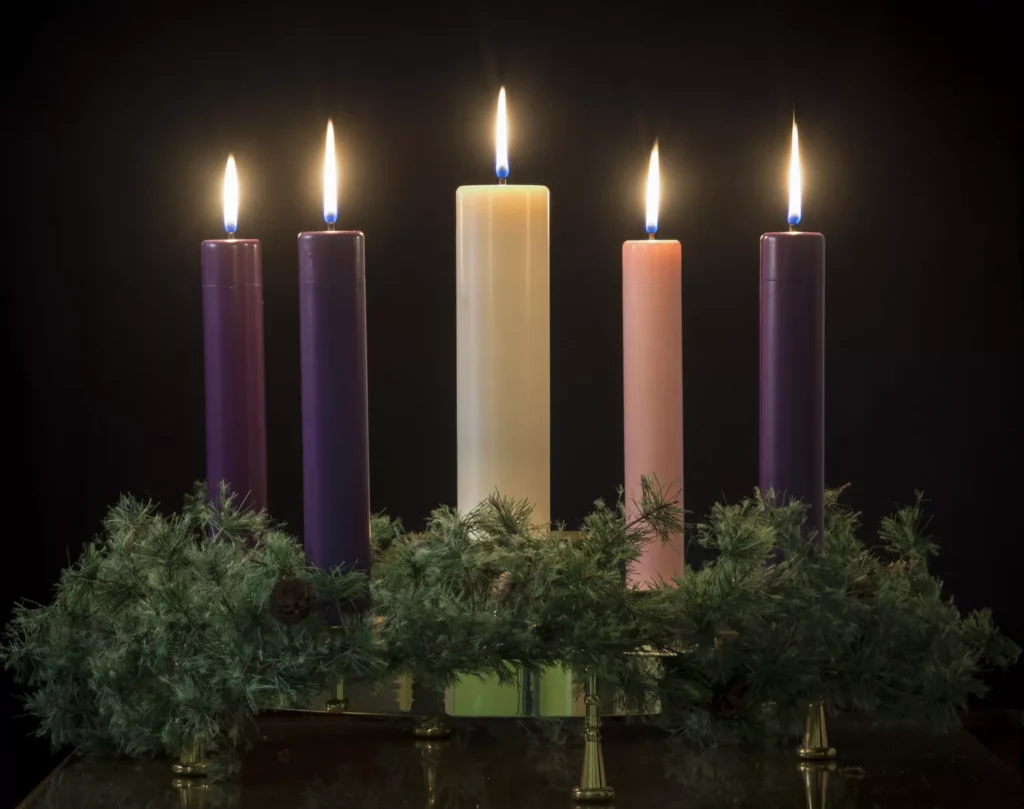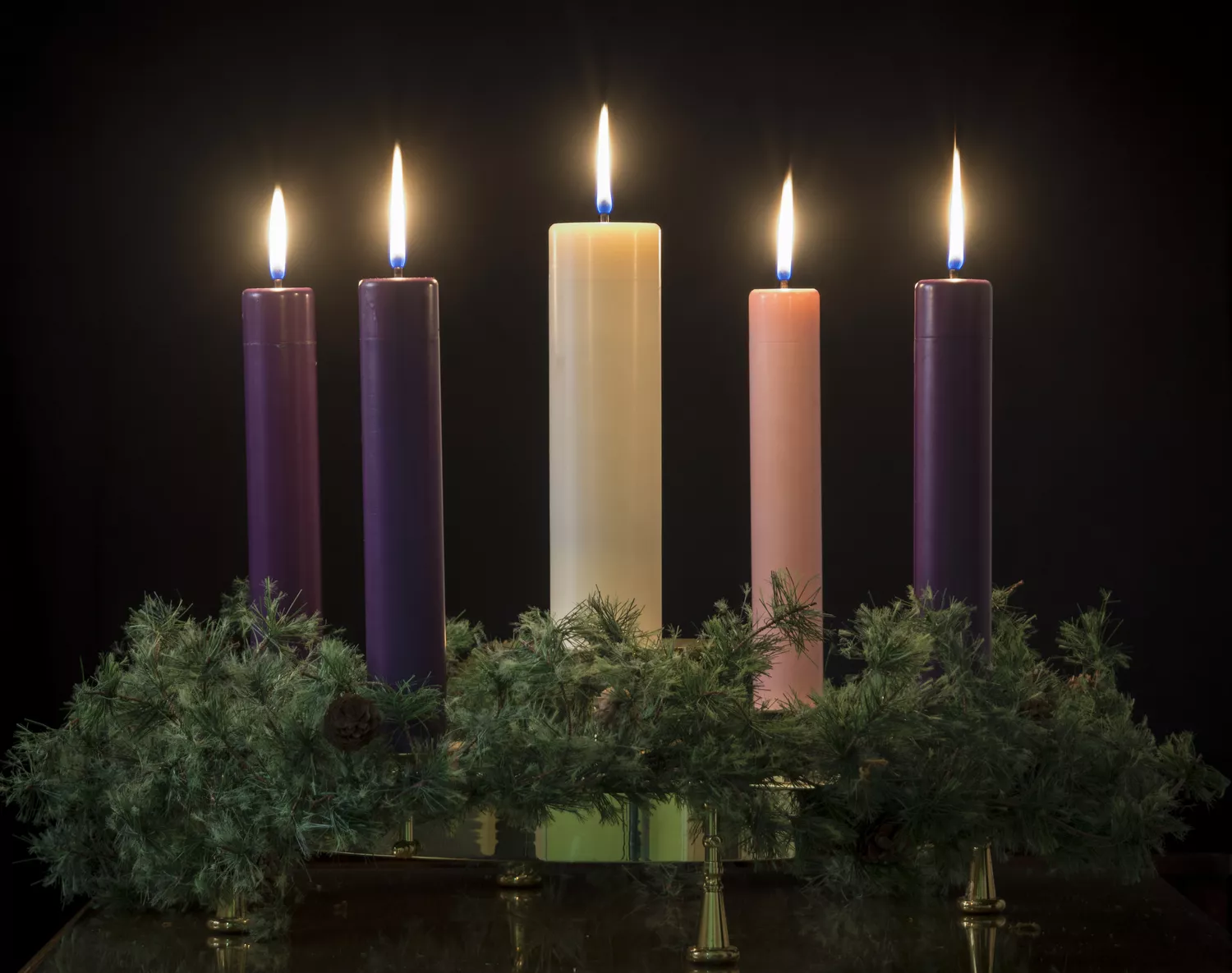Thank you for visiting. We trust that you have enjoyed reading our articles.
Use Advent to Guide Yourself And Your Family Toward Hope, Peace, Joy, and Love

“But you, Bethlehem Ephrathah, though you are small among the clans of Judah, out of you will come for me one who will be ruler over Israel, whose origins are from of old, from ancient times” (Micah 5:2 NIV).
I love Christmas and the Advent season. It is a special time of year for families and the church. The Advent season allows us to prepare our hearts for the birth of the Christ child. I also love all the traditions that come with Christmas – decorating the tree with ornaments that have been passed down from generations, giving and receiving presents, candlelight service at church on Christmas eve, the smell of gingerbread or pecan pies baking in the oven, a fresh pine tree in the house, and the excitement of Christmas day.
One of the traditions of Christmas that we typically gloss over is the advent wreath. Each week we light a new candle, and the symbolism of each is important to help understand Christmas and the Advent season. The Catholic church adopted this tradition during the Middle Ages as a way to prepare the hearts and minds for Christmas. The word advent itself comes from the Latin word “adventus” meaning “arrival.” We prepare for the arrival of Christ. The wreath itself represents eternity and everlasting life, a circle that never ends (John 3:16).
The week one candle is purple and is known as The Prophet’s Candle and symbolizes hope. The week two candle is purple and is known as The Bethlehem Candle and symbolizes peace. The week three candle is pink or rose-colored and is known as The Shepherd’s Candle and represents joy. The week four candle is purple and is known as The Angle’s Candle and represents love. The week five candle is white and is known as “Christ’s Candle” and represents the Advent Child, Jesus.
I have visited with men all over this world and found very few to have an abundance of the four characteristics of Advent. Those that typically have these attributes in abundance are those that society would consider “poor,” but Jesus would likely refer to them as “the least of my brothers and sisters” (Matthew 25:40).
How can people living in poverty have the four components of Advent with no pension, no HMO or PPO health care, no private school for their children, no bass boat, no four-wheel drive truck, no chance of ever visiting Bass Pro or Cabela’s, no XM radio, no season tickets for the local sports team, no Polo cologne, and no ostrich boots or big belt buckles? As a younger man, I would not have a clue how to begin to answer this question. Now, as an older man I have the benefit of traveling the world, talking to men, and most importantly talking and listening to God through His Word. I still do not claim to have any answers for anybody or any topic, but I do know the One that does ,,,,,, and so do “The least of my brothers and sisters.”
They have hope because they live the promise of Jeremiah 29:11 “For I know the plans I have for you,” declares the Lord, “plans to prosper you and not to harm you, plans to give you hope and a future (emphasis added).”
They have peace because they know that they abide in God and He in them (John 15:4, emphasis added).
They have joy because they understand Psalm 16:11. “You make known to me the path of life; in Your presence there is fullness of joy; at your right Hand are pleasures forevermore (emphasis added).”
Last but not least, they have love because they know Jesus as their Lord and Savior and believe that God is love (1 John 4:8, emphasis added).
All of these things are possible because they have the fifth candle in their heart, Jesus. Jesus said in Luke 18:27, “What is impossible for man is possible with God.”
It is really as simple as that. Hope, peace, joy, and love will not be found in any material possession. They are nice, make us temporarily happy, and might impress our neighbors but do little to advance our pursuit of Christ. The four attributes of Advent, and even more, will be given to us but only by surrendering all to Jesus and acknowledging Him as Lord and Savior. If you are interested in the “more” part, please read Galatians 5:22-23 and imagine how you, your family, your church, and your community could be transformed by a life lived blessed by the Fruits of the Spirit. Talk to your pastor, pray to God, find a small group of like-minded men, look for resources from groups/authors such as Promise Keepers, Man In The Mirror, Patrick Morley, Max Lucado, Gary Chapman, etc. and search for a copy of the book Lead Like Jesus.
Many readers may recall how Simon Peter and his brother Andrew were fishermen but yet they left their nets behind when called to follow Jesus. Similarly, in Luke 18 Jesus was asked by a rich ruler what he must do to inherit eternal life. He had already honored the commandments his entire life. Jesus said to him, “You still lack one thing. Sell everything you have and give to the poor, and you will have treasure in heaven. Then come, follow me.” Scripture tells us that the man went away sad because he was wealthy. Afterwards, Jesus turned to His disciples and said, “Truly I tell you, it is hard for someone who is rich to enter the kingdom of heaven. Again, I tell you, it is easier for a camel to go through the eye of a needle than for someone who is rich to enter the kingdom of God.” This connection between earthly wealth and heavenly reward is also addressed in Luke 16:13 and Matthew 6:24. “No one can serve two masters. Either you will hate the one and love the other, or you will be devoted to the one and despise the other. You cannot serve both God and money” (Luke 16:13, Matthew 6:24). “The least of my brothers and sisters” do not have to make the decision between serving God and money, but each of us, regardless of wealth, must answer the same question that Jesus posed to His disciples in Luke 9:20, “Who do you say I am?” Our answer to this question has eternal implications.
I do not think that Jesus is calling us today to sell everything we have to follow Him, nor do I think He would disapprove of our material possessions. However, I do feel that Jesus wants us to worship Him first, not our material possessions. One of the ways we worship Him is in how we treat “The least of my brothers and sisters.”
For Christmas this year, I want to receive hope, peace, love, and joy for the new year. I do not want to receive it transactionally as the world gives, but supernaturally as our Lord gives. I want a hope, peace, love, and joy that transcends all understanding, and I want that for you too. I want more of Jesus in me and less of me in me. If you seek the same for yourself, I invite you to join me in the prayer below.
Prayer: Merciful God, We confess that we have failed to an obedient church. We have failed to follow your commands and to hear the call of the least of our brothers and sisters. We have stored up our treasure on earth with little to no regard for our treasure in heaven. We have lost our hope, peace, love, and joy because we have strayed from You. Forgive us of our sins and restore in us a new heart in this season of Advent that yearns to only be satisfied by words and actions that bring glory and honor to You. Amen!
Meet the Author
Todd Shupe is a Men’s Ministry Specialist through the General Commission of United Methodist Men and is in training to be a Certified Lay Minister through the Louisiana Conference of the United Methodist Church. He currently serves as the President of the Baton Rouge District of United Methodist Men and is a Board Member for Gulf South Men and serves on the Action Team for The Kingdom Group. He is a volunteer for the Walk to Emmaus, Grace Camp, and Iron Sharpens Iron. Todd resides in Baton Rouge, Louisiana.
We welcome your comments below.
Liked this post?
Read more below or search for more topics...
-
Men, You Can Add Power to Your Prayers!
Men, You Can Add Power to Your Prayers! “Therefore I tell you, whatever you ask for in prayer, believe that you have received it, and it will be yours” (Mark 11:24 NIV). Our prayers already have great power – more than we can ever imagine. The problem is that we often fail to recognize the power of our prayers.Prayer is an open line of communication with God. The idea that we have 24/7 ability to connect to the Creator of heaven and earth is hard to comprehend.First, why would God want to talk with us? Is there a right and wrong way... -
Childlike Heart: Key to Heaven
Childlike Heart: Key to Heaven “And they were bringing children to him that he might touch them, and the disciples rebuked them. But when Jesus saw it, he was indignant and said to them, “Let the children come to me; do not hinder them, for to such belongs the kingdom of God. Truly, I say to you, whoever does not receive the kingdom of God like a child shall not enter it.” And he took them in his arms and blessed them, laying his hands on them” (Mark 10:13-16 ESV). There is no greater gift from God than the blessing of a... -
Lessons Learned Under A Broom Tree
Lessons Learned Under A Broom Tree “A voice said to him, Why are you here, Elijah? He replied, “I have been most zealous for the Lord, the God of hosts, but the Israelites have forsaken your covenant. They have destroyed your altars and murdered your prophets by the sword. I alone remain, and they seek to take my life.” (1 Kings 19:13-14 NIV). The broom tree is a desert shrub that grows across Arabia and throughout the Judean wilderness. Its deep roots draw in the moisture of land that is otherwise barren. In the Bible, desert shrubs such as the broom tree...




